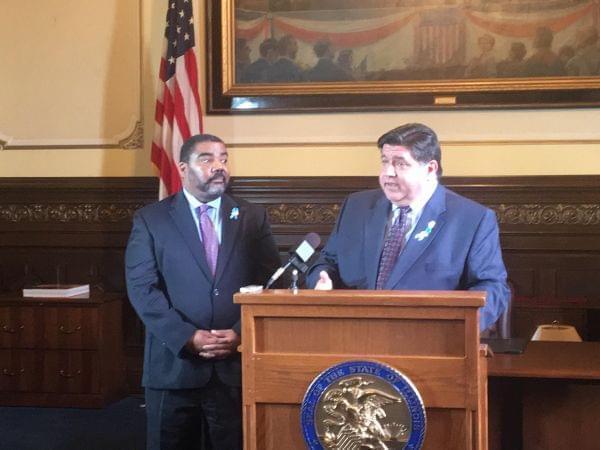Gov. Pritzker Announces DCFS Overhaul

Gov. J.B. Priztker and DCFS Acting Director Marc Smith announced plans to overhaul the department's troubled Intact Family Services unit. Dana Vollmer/NPR Illinois
Gov. J.B. Pritzker announced plans Wednesday to overhaul the state’s troubled child welfare system. That comes after a report criticized the Department of Children and Family Services’ reluctance to remove children from their homes.
The report focuses on DCFS’ Intact Family Services unit, which aims to keep families together despite allegations of abuse or neglect. The voluntary program, run mostly by private community organizations, serves almost 5,000 Illinois families with nearly 12,000 children each year.
The governor commissioned Chapin Hall, a child welfare think-tank based at the University of Chicago, to identify long-standing structural issues within the department. Researchers made nine recommendations — including improving supervision, refining protocol for Intact cases and working with state’s attorneys to make necessary removals.
“I want to be clear: We will be adopting every recommendation in this report with as much expediency as possible,” Pritzker said, but added that it will take time to accomplish.
For now, Pritzker said, the department will review 1,100 open cases involving young children. It will also create a Crisis Intervention Team to immediately investigate the deaths of children under DCFS’ care.
Pritzker also committed to hiring 126 new child welfare workers — and re-training existing staff.
DCFS Acting Director Marc Smith said he would work with all parties to ensure children’s safety is at the forefront.
“We don’t want there to be a culture of making decisions to take children,” Smith said. “We don’t want there to be a culture of making decisions to leave children at home. We want the culture to be: make decisions based on what’s best for the individual child and family, where their safety and risk are taken into consideration about the outcome.”
According to the report, Illinois’ rate of death due to child maltreatment was 2.16 per 100,000 children in 2016 — lower than the national average of 2.36 per 100,000 children.
The state also has one of the lowest child removal rates. But James McIntyre, president of the Illinois Chapter of the Foster Care Alumni of America, said that’s not necessarily something to be celebrated.
“We live in a society where we do not report,” McIntyre said. “During the summer, we see calls decrease, because the kids aren’t in front of a mandated reporter every single day.”
Andrea Durbin, CEO of the Illinois Collaboration on Youth, said it’s important to remember the lasting effects of separating families.
“Removing children from a home is not a benign experience. It’s a traumatic experience for children — and for parents,” Durbin said. “The vast majority of child welfare involvement is driven by neglect, and a lot of what looks like neglect looks also like poverty.”
